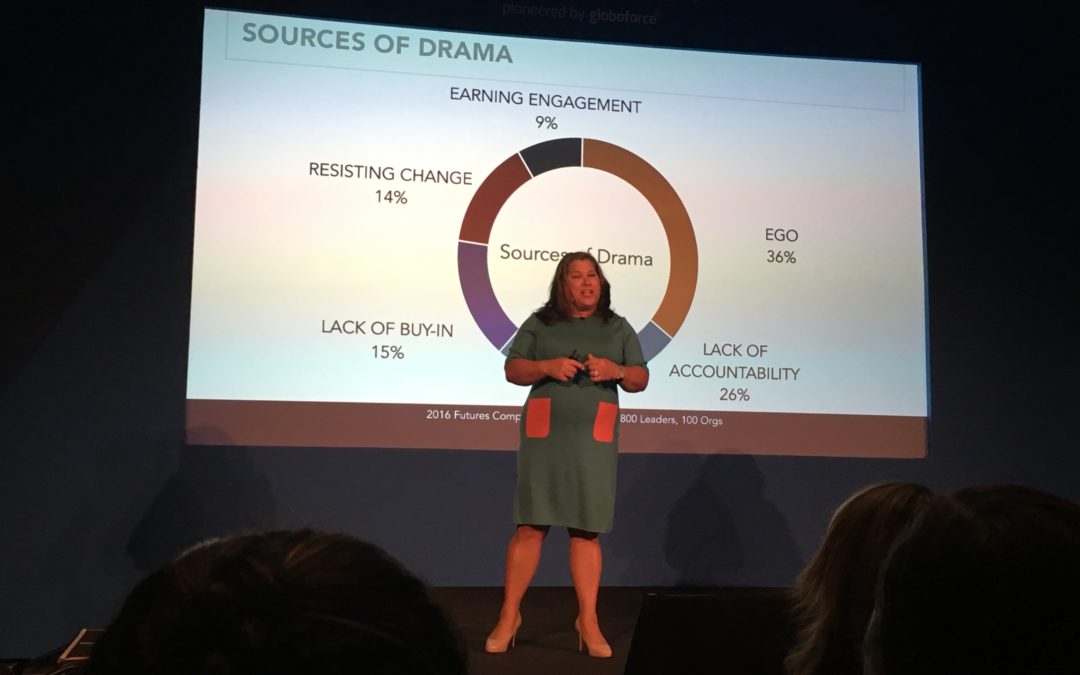One of the first questions I ask leaders during our client discovery process is “what keeps you from being the leader you strive to be?” As Cy Wakeman shared in her session at WorkHuman, the answers I usually get are not the true reality. She dropped truth-bombs throughout her session.
Here, I’m sharing a little taste of the truth about leadership today. Cy Wakeman is the author of Reality-Based Leadership: Ditch the Drama, Restore Sanity to the Workplace, and Turn Excuses into Results. Her session at the WorkHuman conference was the most surprisingly fabulous one I attended. (Michelle Obama and Adam Grant rocked, but that was to be expected). I did not know anything about Wakeman when I selected her session, and within minutes I was asking “where has she been all of my career!?!”
OK, so let’s start with the problem. Leaders tend to place blame on a lot of external forces when it comes to what gets in the way of doing their best work – other people, the amount of work, lack of resources. As Cy Wakeman explained, this is not true.
The real problem is the “way we think about our circumstances and the way we lead people.”
Cy explained that we need to challenge our beliefs and assumptions, and she used inspiring and challenging quotes and anecdotes to illustrate this in a greatly entertaining way.
I couldn’t agree with Cy more. In our courageous conversations workshops, we get people to consider the story they’ve told in their heads about the difficult people and situations they have to deal with. Then we have them re-write the story, removing assumptions and worst-case scenario plots from it. We encourage leaders to assume that the other people involved have positive intentions, and that they are reasonable and intelligent, rather than seeing them as antagonists in our drama.
Wakeman takes this activity a step further, and has people write down the story and then cross out everything that is not actual fact. (We’ll be adding this to our process!)
Suddenly, the story about your colleague being angry at you because of an email you sent and demonstrating this by giving you the cold shoulder at a meeting becomes a simple fact – “Bob did not speak to me directly during the meeting.” In removing any assumptions and drama that we’ve added, we’ve now made the situation less personal and confrontational. There are many reasons Bob may not have spoken to us at the meeting, and most of them have absolutely nothing to do with a negative emotional situation involving us.
Another great take-away, that I plan to implement personally with my clients, is reducing the amount of “venting” that people do. I have always thought that some level of venting is necessary for people to get the negative emotions out of the way, but so often this takes over, and people focus on trying to change reality, rather than changing our mindset about the reality we now face.
Wakeman described venting as “the ego’s way of avoiding self reflection.” This as well as her assertion that “venting is a complete waste of time,” struck a chord with me. I realized I need to get better at directing this energy in a positive way when someone says they want to vent.
And a third extremely relevant point I took away from Cy Wakeman’s presentation is the difference between sympathy and empathy. Jeff Weiner, CEO of LinkedIn has spoken about compassion vs empathy, and the message from Cy was similar but I liked the way she described the difference.
Sympathy is about hearing, agreeing but not necessarily doing much. When being empathetic, Wakeman challenged us to see a person struggling and to call them to greatness. It’s up to us as leaders to help others stop spreading drama and realize how they can be great in the new reality. Cy’s questions for self-reflection help people to stop venting and struggling and step into leading.
Almost immediately after Cy’s session at WorkHuman, I kindled one of her books, and I highly recommend it if you want to “ditch the drama” and live the truth of leadership. I find, throughout my work, a need for leaders to start facing reality and moving on with the things they can influence or control, rather than focusing on things outside their control. Time after time, I find myself coaching people on mindset rather than on leadership tactics. I absolutely loved Cy’s engaging, humorous, but real-life way of discussing this. If you have the chance to see her, do it!
And if you haven’t already registered for WorkHuman 2018, do that now!!! I’ll see you there!


Recent Comments